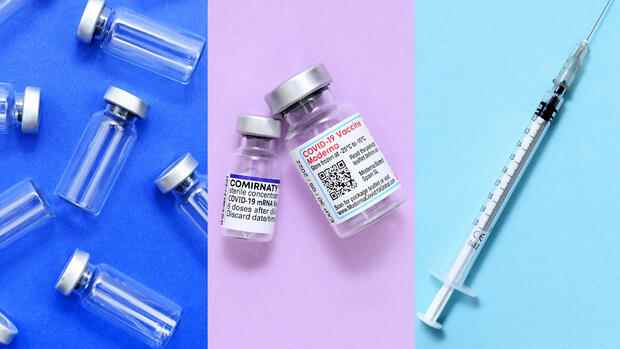Frankfurt The corona business is once again giving the leading vaccine manufacturers very high sales and profits this year. This was only shown on Tuesday by the surprisingly strong quarterly figures from industry leader Pfizer. On the other hand, it remains uncertain how much will remain for the corporations in the long term from the Covid boom.
So far, the companies themselves have found it difficult to make concrete statements. On Tuesday, Pfizer increased its sales forecast for the Comirnaty vaccine developed together with the Mainz-based company Biontech by two billion to $34 billion. Together with the drug Paxlovid, the US group expects sales of 56 billion dollars in the current year. However, Pfizer does not yet dare to make any forecasts for the coming year.
When asked by analysts, company boss Albert Bourla did not rule out that Comirnaty and Paxlovid together could still generate annual sales of up to 15 billion dollars by the end of the decade. “Even though sales are likely to be down from 2022, we believe our Covid business will generate billions in revenue for the foreseeable future,” Bourla said.
Exactly what dimensions this could involve remains open. So far, both the Pfizer boss and many analysts have assumed that a market similar to that for flu vaccines could develop with annual booster vaccinations, especially for older and particularly vulnerable people. This is worth about seven billion dollars.
Top jobs of the day
Find the best jobs now and
be notified by email.
The Pfizer boss sees 2023 as a year of transition. At least in the United States, the sale of vaccines will shift from government orders to the regular market, where purchases will be financed privately or by health insurance companies.
Corona vaccines: smaller quantities, higher prices
The Covid business should then be characterized by significantly lower sales volumes with noticeably higher prices. Pfizer has previously announced that it is targeting prices of around $110 to $130 per dose for the Covid vaccine in the commercial market, up from $18 in the first government contracts. Pfizer was already able to push through higher prices in the most recent supply agreements with the US government.
The British market research company Airfinity estimates that the two leading providers, Pfizer/Biontech and Moderna, are likely to sell around 1.6 billion cans in 2023, compared to three billion cans in the current year and 5.7 billion cans in 2021. The sales of the two market leaders with However, thanks to higher prices, their Covid vaccines will only fall by a fifth to a total of 47 billion dollars.
In contrast, the forecasts of most bank analysts are much more cautious. According to data from Bloomberg, on average they expect Biontech and Moderna to have vaccine sales of about $9.5 billion each in the coming year, after expected revenues of $16 billion for Biontech and $21 billion for Moderna in the current year. On average, the analysts assume that the proceeds will be cut in half.
But even at this level, the deal would still be a bountiful source of income for the two companies. Only very few biotech companies have even managed to generate billions in revenues with products they have developed themselves.
“We believe our Covid business will generate multi-billion dollar revenues for the foreseeable future.”
(Photo: Reuters)
At Pfizer, the experts are currently expecting a drop in sales of a little more than a fifth to 78 billion dollars. About $30 billion of that is likely to come from the Comirnaty vaccine and the drug Paxlovid. That would correspond to a minus of about 45 percent.
The future market potential will not only depend on the further course of the pandemic and the general willingness of the population to be vaccinated. How quickly the previous state stock purchases will be used up and the transition to commercial distribution with higher prices will also play a role. In Europe, where the EU Commission has firmly ordered 900 million vaccine doses from Pfizer/Biontech alone, this is likely to take longer than in the USA.
mRNA vaccines will continue to dominate
Another uncertainty factor is the future competitive situation. So far, experts expect that the two market leaders will continue to gain market share with their mRNA vaccines. They already have a significant lead in the market and in terms of clinical data. In addition, the technology offers greater flexibility in the development of modified vaccines. They are the only manufacturers already on the market with omicron-specific vaccines.
Airfinity analysts therefore assume that Pfizer/Biontech and Moderna will expand their market share in western countries from the current 87 percent to around 94 percent in the coming year. Potential competitors such as Novavax and Valneva have already had to significantly reduce their sales forecasts for 2022. Johnson & Johnson and Astra-Zeneca have been virtually unable to sign new supply deals since 2021.
On the other hand, the field remains in flux and characterized by imponderables. Bloomberg Research’s Sam Fazelli, for example, points to initial analyzes indicating that the Biontech/Pfizer and Moderna bivalent omicron vaccines do not generate significantly higher antibody responses than a second booster shot of the original vaccine. That could still open the door for competing products, such as the vaccine from Sanofi and GSK, which is in the approval process.
In addition, a lot of research is going on in this area. According to the latest WHO data, there are still 172 Covid vaccine candidates in clinical development worldwide.
More: Business with Covid vaccines is developing better than expected for Pfizer
